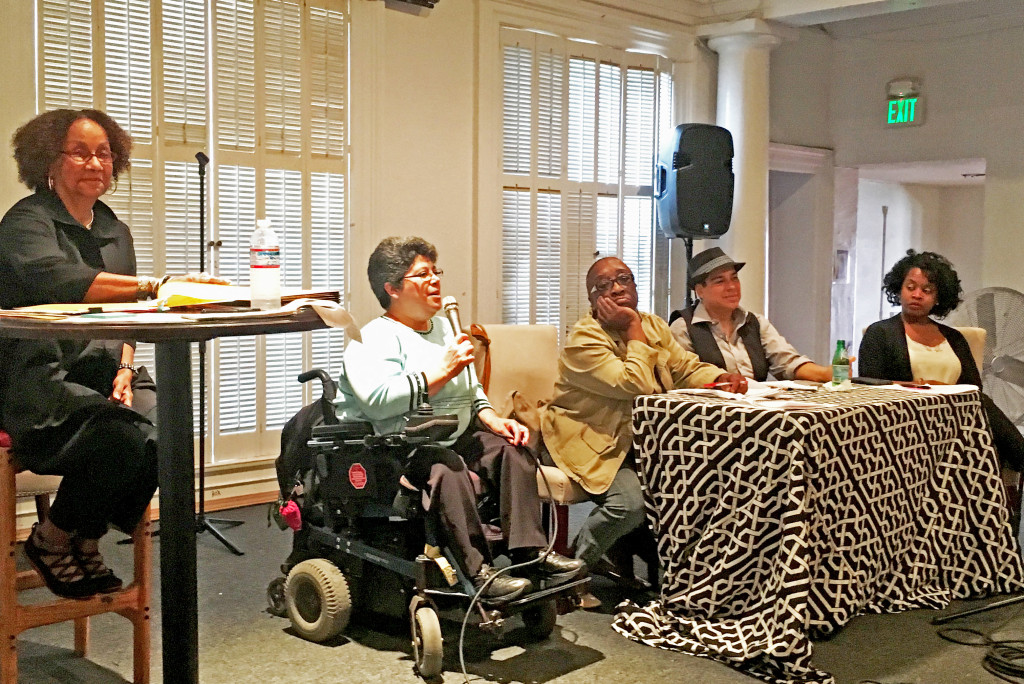City of Oakland and Local Businesses Must Hire Oakland Now, Say Community Leaders
Oct 10, 2015
Rights/Equity, Gentrification, Housing/Foreclosures, Immigrant Rights, Labor, LGBT, Oakland Job Programs, Reentry/Formerly Incarcerated

Speakers at the Post Salon on jobs for Oakland residents were ( L to R): Gay Plair Cobb, CEO of the Oakland Private Industry Couuncil; Alicia Contreras, executive director of the Spanish Speaking Citizens’ Foundation; Margaret Gordon, co-founder of the West Oakland Environmental Indicators Project (WOEIP); Rebecca Kaplan, Oakland City Councilmember: and Caroll Fife, OaklandWORKS. Photo by Ken Eptein
By Ken Epstein
A seemingly declining jobless rate masks the actual reality in Oakland where 19 percent of the city’s residents live in poverty, and many Oaklanders are being forced out of the city due to a lack of decent paying jobs, combined with out-of-control rent increases.
The issue of joblessness and what city government and local businesses can do right now to hire Oakland was the subject of a recent Oakland Post Salon, where a panel of community leaders discussed how residents can push for solutions to the continuing unemployment crisis.
“We need to call on every employer in the city to hire people from Oakland – an Oakland opportunity challenge so every business can be proud to say, ‘We hire Oakland,’” said Carroll Fife, a member of the OaklandWorks coalition and one of the speakers at the Sept. 27 Post salon.
The opportunity challenge, backed by a growing coalition of organizations, will encourage Oakland’s businesses and restaurants to hire Black and Latino residents and follow up with meetings with owners, as well as public protests, if necessary.
OaklandWorks also wants the city to enforce its local hiring policies on city-funded construction projects. Such a policy was passed during the administration of Mayor Ron Dellums but never implemented by city staff.
“We have a 50 percent local hire ordinance – We want contractors to recognize those priorities,” said Fife.
Gay Plair Cobb, CEO of the Oakland Private Industry Council, moderated the panel and pointed out the realities of joblessness in Oakland.
“We’re talking about the lost, the last, the lonely and the left out – homeless people, the formerly incarcerated, displaced workers, younger and older workers who face age discrimination, those displaced by technology, those who face the barriers of physical limitations and immigrants,” said Cobb.
“All these groups represent the absolute urgency of what is happening and what is not happening,” she said.
Oakland’s official unemployment rate is 12.5 percent, higher than many other places, but the real unemployment rate is probably double that amount, because there are many people who stopped looking for work and are no longer counted, according to Cobb.
“Unemployment for African American youth and Latino youth is off the charts,” she said.
She said federal funding for job training and placement has been declining, but Oakland, unlike nearby cities, fails to invest any funds from its budget to support the programs that are carried out solely by nonprofit service providers.
Compounding the problem, Cobb said, the city spends one-third of its federal job funding for administrative overhead – to pay for city staff instead of putting the money onto the street to help the unemployed.
Another speaker, City Councilmember Rebecca Kaplan, said creating jobs for Oakland residents needs to be a city priority.
“Our job is to lift up those who are struggling,” she said.
Kaplan said she authored a resolution that requires a Disparity Study, which will show what companies are receiving City of Oakland contracts. Though the resolution was passed and funded a year ago, the study still has not been completed, she said.
“We still need the administration to actually complete the Disparity Study,” she said.
The last Disparity Study, completed over seven years ago, showed, “When (city) contracts go out, they overwhelmingly go out to a handful of white-owned, male businesses, (not) anyone outside the favored few,” said Kaplan.
Kaplan supports removing the oversight of federal job funds from the city, to hire an outside agency that will carry out the oversight more effectively and efficiently.
“Federal money for job training needs to be used for job training, not for administrative overhead,” she said.
Speaker Alicia Contreras, executive director of the Spanish Speaking Citizens’ Foundation, emphasized the common fight of Blacks and Latinos, immigrants, people with disabilities and LGBT workers.
“We have to break barriers,” she said. “When we get all these minorities together, we are not a minority any more. We are a majority. We are all connected. That is the key for Oakland to move forward.”
Margaret Gordon, co-founder of West Oakland Environmental Indicators Project (WOEIP), said West Oakland residents had been promised jobs on the Oakland Army Base development, but they have not materialized.
“We still have to have a mechanism to connect the jobs to those who are most in need of those jobs,” said Gordon.
For more information, go to Oakland-WORKS on Facebook.